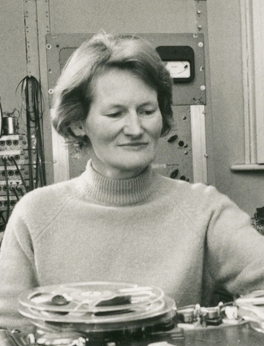I never miss an episode of BBC Radio 6 Music’s Freak Zone Playlist, a one-hour selection picked by a different person (or sometimes group) each week. A couple of weeks ago was the 2024 Oram Awards Special hosted by Karen Sutton, who ran the Oram Awards: “a platform to elevate the work and voices of women and gender non-conforming artists innovating in sound, music and related technology.”

There’s a lot of good music in the hour, but I was particularly struck by the two pieces by Daphne Oram, for whom the award is named. I’m embarrassed to say I didn’t know of her, but she was a co-founder of the BBC Radiophonic Workshop, though she soon left to work on her Oramics composition system. This is amazing stuff, and I bought Oramics on Bandcamp to start to get to know her work. See the Daphne Oram Trust for much more, and “How Daphne Oram’s Oramics machine paved the way for the modern DAW” from Future Music magazine earlier this year.
The Wikipedia article mentions a BBC Radio 3 documentary about Oram: Wee Have Also Sound-Houses (sadly not available for listening at time of writing). There’s a footnote saying it’s a quote from Francis Bacon (the one from the 1600s), from his incomplete novel New Atlantis. Modernized, the full paragraph goes:
We have also sound-houses, where we practise and demonstrate all sounds and their generation. We have harmony which you have not, of quarter-sounds and lesser slides of sounds. Divers instruments of music likewise to you unknown, some sweeter than any you have; with bells and rings that are dainty and sweet. We represent small sounds as great and deep, likewise great sounds extenuate and sharp; we make divers tremblings and warblings of sounds, which in their original are entire. We represent and imitate all articulate sounds and letters, and the voices and notes of beasts and birds. We have certain helps which, set to the ear, do further the hearing greatly; we have also divers strange and artificial echoes, reflecting the voice many times, and, as it were, tossing it; and some that give back the voice louder than it came, some shriller and some deeper; yea, some rendering the voice, differing in the letters or articulate sound from that they receive. We have all means to convey sounds in trunks and pipes, in strange lines and distances.
Oram liked this and apparently quoted it often, including in her book An Individual Note of Music, Sound and Electronics, which is in the collection of the library where I work and which I will borrow tomorrow. What an astounding quote. I’m delighted by all these discoveries. All this from one hour of radio!
We have all means to convey sounds in trunks and pipes, in strange lines and distances.
UPDATE (16 October 2024): Below is the original quote as taken from Oram’s book, where it is an appendix on p. 128 (London: Galliard Paperbacks, 1972).
Wee have also Sound-houses, wher wee practise and demonstrate all Sounds, and their Generation. Wee have Harmonies which you have not, of Quarter-Sounds, and lesser Slides of Sounds. Diverse Instruments of Musick likewise to you unknowne, some sweeter then any you have; Together with Bells and Rings that are dainty and sweet. Wee represent Small Sounds as Great and Deepe; Likewise Great Sounds, Extenuate and Sharpe; Wee make diverse Tremblings and Warblings of Sounds, which in their Originall are Entire. Wee represent and imitate all Articulate Sounds and Letters, and the Voices and Notes of Beasts and Birds. Wee have certaine Helps, which sett to the Eare doe further the Hearing greatly. Wee have also diverse Strange and Artificiall Eccho’s, Reflecting the Voice many times, and as it were Tossing it: And some that give back the Voice Lowder then it come, some Shriller, and some Deeper; Yea some rendring the Voice, Differing in the Letters or Articulate Sound, from that they receyve. Wee have also meanes to convey Sounds in Trunks and Pipes, in strange Lines and Distances.
 Miskatonic University Press
Miskatonic University Press